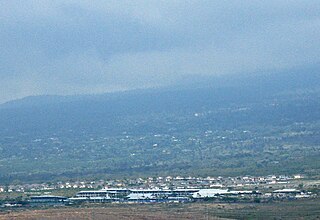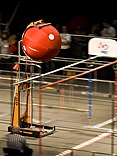The Centennial Challenges are NASA space competition inducement prize contests for non-government-funded technological achievements by American teams.

The FIRST LEGO League Challenge is an international competition organized by FIRST for elementary and middle school students.

FIRST Robotics Competition (FRC) is an international high school robotics competition. Each year, teams of high school students, coaches, and mentors work during a six-week period to build robots capable of competing in that year's game that weigh up to 125 pounds (57 kg). Robots complete tasks such as scoring balls into goals, placing inner tubes onto racks, hanging on bars, and balancing robots on balance beams. The game, along with the required set of tasks, changes annually. While teams are given a kit of a standard set of parts during the annual Kickoff, they are also allowed and encouraged to buy or fabricate specialized parts. FIRST Robotics Competition is one of five robotics competition programs organized by FIRST, the other four being FIRST LEGO League Discover, FIRST LEGO League Explore, FIRST LEGO League Challenge, and FIRST Tech Challenge.

A robot competition is an event where the abilities and characteristics of robots may be tested and assessed. Usually they have to outperform other robots in order to win the competition. Many competitions are for schools but several competitions with professional and hobbyist participants also exist.

FIRST Tech Challenge (FTC), formerly known as FIRST Vex Challenge, is a robotics competition for students in grades 7–12 to compete head to head, by designing, building, and programming a robot to compete in an alliance format against other teams. FIRST Tech Challenge is one of the five major robotics programs organized by FIRST, which its other four programs include FIRST Lego League Discover, FIRST Lego League Explore, FIRST Lego League Challenge, and FIRST Robotics Competition.

Nano Quest was the name of the 2006–07 challenge theme of FIRST Lego League. It revolved around the emerging field of nanotechnology.

FIRST LEGO League Explore (FLLE) is a non-competitive robotics program designed for children ages six to ten. It is one of the programs established by FIRST.

The FIRST Championship is a four-day robotics championship held annually in April at which FIRST student robotics teams compete. For several years, the event was held at the Georgia Dome in Atlanta, Georgia, but moved to the Edward Jones Dome in St. Louis, Missouri in 2011, where it remained through 2017. In 2017, the Championship was split into two events, being additionally held at the George R. Brown Convention Center and Minute Maid Park in Houston, Texas. In 2018 and 2019, the Championship was held in Houston and Detroit, Michigan at the TCF Center and Ford Field. The event comprises four competitions; the FIRST Robotics Competition Championship, the FIRST Tech Challenge World Championship, the FIRST Lego League World Festival, and the FIRST Lego League Junior World Expo.

Kealakehe High School is a public high school located in Kailua, Hawaii County, Hawaii, United States. It has the largest geographic school attendance boundary in the state and covers a geographic district 40 miles (64 km) wide, encompassing the communities of Kailua-Kona, Hōlualoa, Waikōloa, and Puakō. The school motto is "Harmony and unity through dynamic education and community for everyone, every time."
FIRST LEGO Challenge League Open Championships are robotics competitions held and managed by FIRST LEGO League Partners to bring FIRST LEGO League Challenge teams from many states, regions and countries together to compete in host cities around the world. These are the highest level of FIRST LEGO League competitions that are managed by organizations other than FIRST. The FIRST-managed global competition for FIRST LEGO League is the FLL World Festival. There are usually multiple Open Championships each year.
The World Robot Olympiad (WRO) is a global robotics competition for young people. The World Robot Olympiad competition uses Lego Mindstorms manufactured by LEGO Education. First held in 2004 in Singapore, it now attracts more than 28,000 teams from more than 85 countries.

Smart Move is the name of the 2009-10 FIRST Lego League challenge, released September 3, 2009. It is centered on transport and how to make new and more efficient forms.

For Inspiration and Recognition of Science and Technology (FIRST) is an international youth organization that operates the FIRST Robotics Competition, FIRST LEGO League Challenge, FIRST LEGO League Explore, FIRST LEGO League Discover, and FIRST Tech Challenge competitions. Founded by Dean Kamen and Woodie Flowers in 1989, its expressed goal is to develop ways to inspire students in engineering and technology fields. Its philosophy is expressed by the organization as Coopertition and Gracious Professionalism. FIRST also operates FIRST Place, a research facility at FIRST Headquarters in Manchester, New Hampshire, where it holds educational programs and day camps for students and teachers.
Mission Mars was the 2003-04 challenge theme of FIRST Lego League. It revolved around the NASA missions to Mars with the Spirit and Opportunity rovers.

Food Factor is the FIRST Lego League (FLL) competition for 2011-12; released on September 2. It focuses on food safety and methods to prevent contamination.

Body Forward is the 2010-11 FIRST Lego League competition. The project and missions revolve around biomedical engineering.
Climate Connections was the 2008-09 FIRST Lego League competition. Its theme centered on understanding the effects of climate and climate change.

No Limits is the 2004-05 FIRST Lego League challenge theme. It focused on solutions for aiding people with physical disabilities. The year's theme was introduced by the story Late for Lunch by James Patrick Kelly, which the described the life of a disabled child.

Bowled Over!, released on 10 September 2011, is the 2011–12 robotics competition for FIRST Tech Challenge. Two alliances compete to score racquetballs into alliance-colored scoring goals. The name refers to two bowling balls on the field used for scoring points.

Hydro Dynamics is the name of the 2017/18 FIRST Lego League challenge. It focuses on the water cycle and the ways in which humans can influence it. Each event consists of two main portions: the project and robot gameplay. Teams have fewer than ten weeks to prepare for their competitions.

















